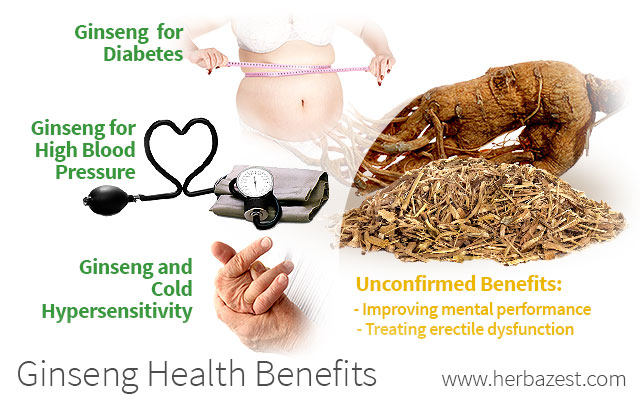This Asian herb has been used for millennia to treat a myriad of health conditions, but what are the benefits of ginseng? Learn more about the scientific studies that corroborate the medical benefits of ginseng and its effectiveness.
Main Benefits of Ginseng
The following health benefits of ginseng root have been established by traditional uses and validated by numerous scientific studies, including human clinical trials.
Ginseng for Diabetes
Many studies have confirmed the effectiveness of ginseng for diabetes. The Panax root exhibits a significant hypoglycemic effect and can help reduce blood glucose levels in diabetics.
In a study published in Evidence-based Complementary and Alternative Medicine (2008) non-diabetic individuals and type 2 diabetic individuals received either American ginseng (P. quinquefolius) or a placebo to be consumed. The study found that the diabetic individuals who received the wild ginseng saw significantly-reduced glucose levels.
Ginseng for High Blood Pressure
When taken along with prescribed medicine, Asian ginseng (Panax ginseng) has been shown to help lower blood pressure, which is beneficial to individuals with hypertension (high blood pressure).
The link between ginseng and blood pressure has been corroborated by a study published in The American Journal of Chinese Medicine (1998), which discovered that 4.5 g per day of red ginseng medication taken over eight weeks significantly lowered the blood pressure of the 26 test individuals. It is important to note that although ginseng is a good secondary treatment for individuals with high blood pressure, those with hypotension (low blood pressure) should not use ginseng.
Secondary Benefits of Ginseng
The secondary benefits of ginseng include those not so frequently used or widely studied, but whose effectiveness has been suggested by some scientific evidence in human subjects, although further research is needed.
Ginseng and Cold Hypersensitivity
Korean red ginseng is used as a source of relief by individuals who experience cold hypersensitivity in the hands and feet. This treatment, especially popular among Asian women, is used in steam form.
A study published in the journal Trials (2013) analized the effects of either Korean red ginseng or a placebo in 80 individuals with cold hypersensitivity over the course of eight weeks. Although the results indicated that the volunteers who received ginseng increased their blood flow, the study acknowledged that more research and studies need to be conducted.
Unconfirmed Benefits of Ginseng
Some of ginseng's benefits have not been frequently used or widely studied, so they are considered unconfirmed. Such benefits have been suggested by some preclinical trials and more further research on humans in needed:
Improving mental performance. Ginseng has shown effects on mental performance, including improved memory and alertness.
Treating erectile dysfunction. This is probably one of the most advertised ginseng benefits for men. While the use of ginseng has shown the ability to help improve erectile function, as well as sexual desire and intercourse satisfaction in both men and women, further studies are needed to fully corroborate this claim.
For all the intensive research that has been done regarding ginseng and its health benefits, there is still much more to be learned and proven. However, from what is known about ginseng so far, its healing and preventative nature may help with a number of health conditions.
Sources
- Nutrition Research, Failure of chronic Ginseng supplementation to affect work performance and energy metabolism in healthy adult females, 1996
- The American Journal of Chinese Medicine, Effect of Red Ginseng on Blood Pressure in Patients with Essential Hypertension and White Coat Hypertension, 1998
- Trials, Effect of Korean red ginseng on cold hypersensitivity in the hands and feet: study protocol for a randomized controlled trial, 2013
- Evidence-based Complementary and Alternative Medicine, Ginseng on Hyperglycemia: Effects and Mechanisms, 2008




